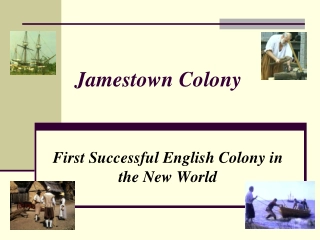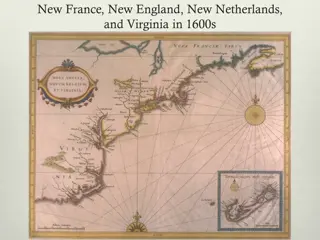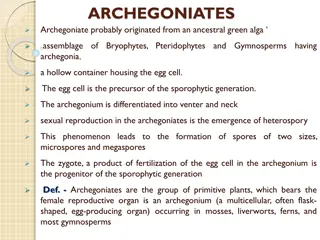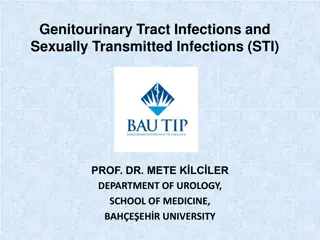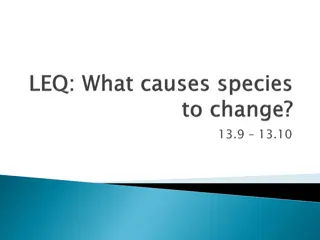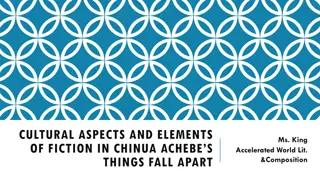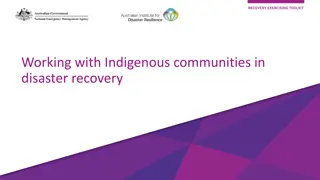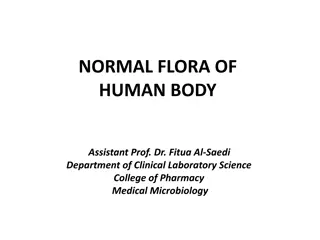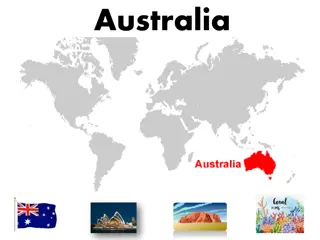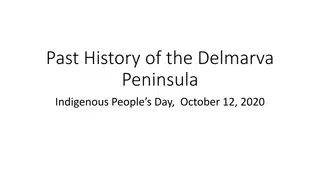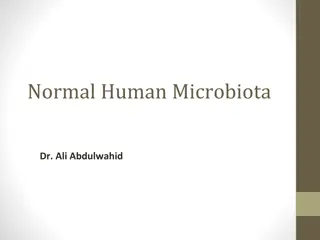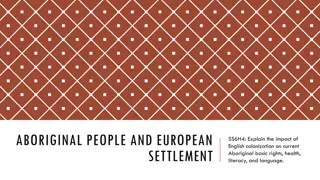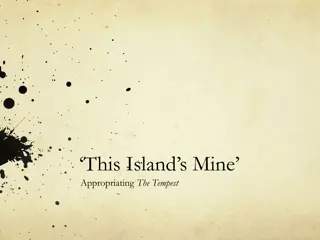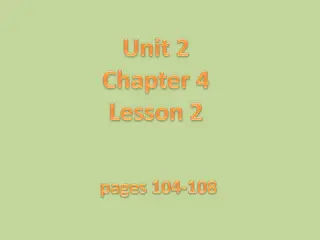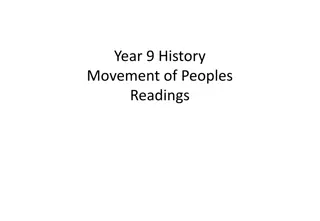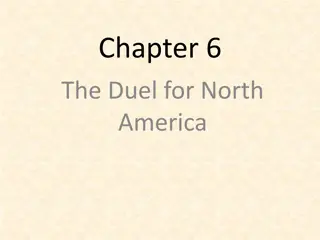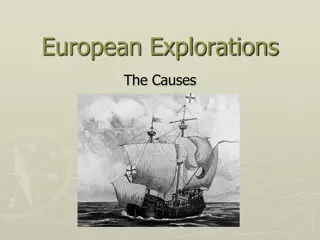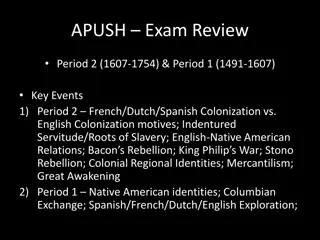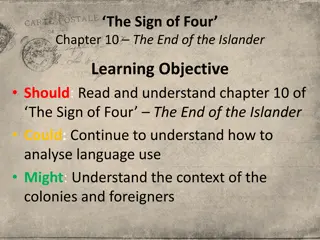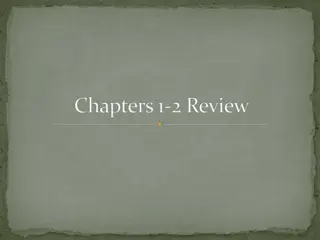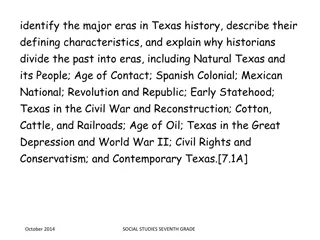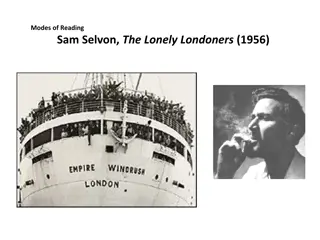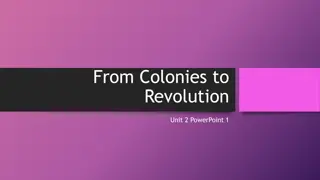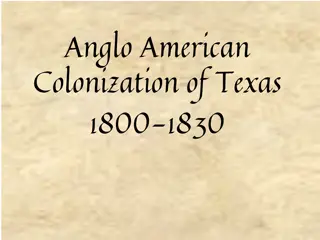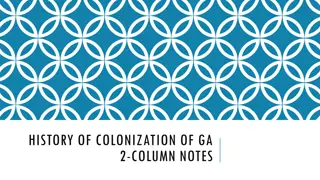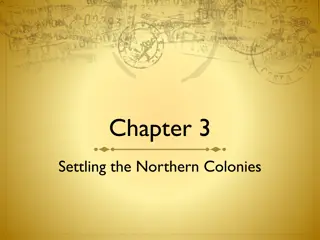Jamestown Colony
The reasons for English colonization, the hardships faced by settlers, and the interactions between the English settlers and the Powhatan people at Jamestown.
0 views • 25 slides
Implementing Personal Protective Equipment in Nursing Homes for Preventing XDROs and MDROs
Learn from infection prevention consultant Karen Trimberger about implementing enhanced barrier precautions in nursing homes to prevent the spread of extensively drug-resistant organisms (XDROs) and multidrug-resistant organisms (MDROs). Explore the difference between colonization and clinical infec
6 views • 33 slides
Colonization and Indigenous Perspectives in 1600s North America
Explore the colonization efforts in 1600s North America by New France, New England, New Netherlands, and Virginia, along with English settlers' perspectives on Native Americans. Discover the contrasting views on land use, settlement practices, and interactions with indigenous populations through his
6 views • 6 slides
Analyzing Historical Sources on Suffragettes, Colonization, and Church Reform
This content focuses on different types of historical sources related to the Suffragette movement, colonization, and Church reform during the medieval period. The primary and secondary sources mentioned include the Tower of London, a letter by William of Normandy, a replica Suffragette sash, Dover C
2 views • 8 slides
Evolution and Characteristics of Archegoniates in Plant Kingdom
Archegoniates, believed to have originated from ancestral green algae, exhibit unique characteristics such as heterospory, presence of archegonia for egg production, and multicellular generations with heteromorphic alternation. They adapted to land by developing specialized structures like rhizoids,
0 views • 15 slides
Overview of Genitourinary Tract Infections and STIs by Prof. Dr. Mete Kılcıler
Genitourinary Tract Infections and Sexually Transmitted Infections (STIs) are common conditions affecting both men and women. This article, presented by Prof. Dr. Mete Kılcıler from the Department of Urology at Bahçeşehir University School of Medicine, delves into the various aspects of UTIs, in
2 views • 47 slides
Understanding Evolutionary Mechanisms: Natural Selection, Genetic Drift, and Gene Flow
Exploring the forces behind evolutionary change, this content delves into natural selection, genetic drift, and gene flow. Examples such as the bottleneck effect, founder effect, and Amish population polydactylism are presented to illustrate how these mechanisms shape genetic diversity. The impact o
0 views • 14 slides
Understanding Global Distribution Patterns of Animals in Climatology and Biogeography
Studying the distribution patterns of animals globally involves complex factors such as environmental conditions, zonal patterns, and latitudinal influences. Animal distribution is influenced by factors like sunlight availability, vegetation diversity, and evolutionary origins. Different animal zone
3 views • 20 slides
Cultural Aspects and Fictional Elements in Chinua Achebe's 'Things Fall Apart'
'Things Fall Apart' by Chinua Achebe explores the impact of colonization on traditional Igbo culture in Nigeria in the late 1800s. The novel delves into themes of cultural change, characterizing figures like Okonkwo and Unoka amidst a backdrop of polygamy, agriculture, ancestral worship, and the cla
0 views • 5 slides
Understanding Indigenous Communities in Disaster Recovery
Increased understanding of intrinsic strengths and unique impacts of disasters on Indigenous communities, role of Indigenous community-controlled organizations, importance of connection to Country, and need for engagement with Indigenous communities by emergency management agencies. Disasters have u
0 views • 21 slides
Normal Flora of Human Body
Normal flora, comprising bacteria and fungi, are beneficial residents of specific body sites like the skin, colon, and vagina. These organisms, known as commensals, play a vital role in maintaining a healthy microbial balance. The internal organs are usually sterile, while different types of normal
2 views • 16 slides
Discovering Australia: Geography, History, and Impact of Colonization
Australia, with its unique features like the Great Barrier Reef, Uluru/Ayers Rock, and diverse ecosystems, has a rich history shaped by colonization and the impact on Aboriginal communities. This article explores Australia's geography, natural resources, population distribution, and the effects of E
0 views • 15 slides
Uncovering the Past: Indigenous History of the Delmarva Peninsula
Delve into the rich indigenous history of the Delmarva Peninsula, acknowledging the injustices and hardships faced by Native American communities. From Columbus' invasion to the Trail of Tears, explore the impact of colonization on indigenous peoples and the ongoing efforts to address historical mis
0 views • 15 slides
Understanding Normal Human Microbiota and Its Role in Health
Normal Human Microbiota, consisting of microbes on the skin and mucous membranes, play a crucial role in human health by providing defense against pathogens, aiding in digestion, and contributing to immune system maturation. The microbiota can be resident or transient, with colonization starting at
0 views • 27 slides
Impact of English Colonization on Aboriginal Rights and Health in Australia
English colonization in Australia had a profound impact on current Aboriginal basic rights, health, literacy, and language. The arrival of Europeans led to the decimation of the Aboriginal population through diseases like smallpox, displacement from their lands, loss of cultural practices, and suppr
2 views • 9 slides
Exploration and Colonization of the Americas
Before Columbus, Native American groups thrived across the Americas, ushering in the Agricultural Revolution. European explorers like Columbus, Portuguese, and Spanish ventured west in search of Eastern goods and new lands, leading to colonization, conflicts, and the Columbian Exchange. Motivated by
2 views • 56 slides
Key Concepts of Colonization in North America: 1607-1754
Europeans from Spain, France, the Dutch, and England established colonies in North America with differing economic and imperial goals. Spain aimed for strict control and exploitation, while the French and Dutch focused on trade partnerships with Native Americans. English colonization attracted a lar
0 views • 11 slides
Exploring Shakespeare's "The Tempest" Through Historical Contexts and Performance Adaptations
Delve into the world of Shakespeare's "The Tempest" by unraveling its historical inspirations from the shipwreck of the Sea Venture to the colonial backdrop of the Americas. Discover how this classic play reflects the early stages of European colonization and exploitation while examining notable per
0 views • 39 slides
Colonization Test Review - Mr. Shaffer 2015
Explore key terms related to colonization including joint-stock companies, plantations, indentured servants, indigo, mercantilism, Middle Passage, toleration, charter, apprentice, and more. Enhance your understanding of the colonial era with this comprehensive review.
0 views • 51 slides
History of European Colonization in America
The visual content and text describe the early colonization of America by Europeans, focusing on the establishment of colonies like New Sweden and New Netherland. It illustrates the interactions between European settlers and Native Americans, the competition for land, and the growth of colonies at t
0 views • 14 slides
Historical Movements: Gold Rushes and Colonization in North America and Australia
The reading explores the impact of the Gold Rush in California and Australia, leading to mass migrations in search of wealth and opportunities. It delves into the colonization efforts and expansionist pursuits of British control, discussing push and pull factors that influenced emigration to North A
0 views • 13 slides
The Duel for North America: France's Colonization Efforts
France, like England and Holland, was a latecomer in the race for North American colonies. King Louis XIV took an interest in overseas territories, leading to the establishment of Quebec in 1608. Samuel de Champlain played a key role in French colonization efforts, forging alliances with Native Amer
0 views • 20 slides
The British Exploration and Colonization Journey
British exploration and colonization efforts were motivated by various factors such as internal problems in England, surplus population, and the quest for new opportunities. Despite initial challenges and failed attempts, the British eventually began to spread their influence in the New World throug
0 views • 45 slides
Causes and Motivations Behind European Exploration and Colonization
European exploration and colonization in the 15th century were primarily driven by a quest for natural resources, the search for new trade routes to Asia, religious motivations to spread Christianity, and the desire for glory and expansion of territories. Competitions among European countries, such
0 views • 14 slides
Key Events in Early American Colonization: Motives, Interactions, and Consequences
Early American colonization during Periods 1 and 2 (1491-1754) involved various European powers establishing settlements in the New World. Driving factors included economic interests, the use of indentured servitude and the roots of slavery, complex relations with Native Americans, and significant e
0 views • 40 slides
Native American Cultures and European Colonization in APUSH Midterm Review
Explore key differences among Native American tribes pre-Columbus, noting similarities in matrilineal societies and religious practices. Delve into the impacts of European arrival on environment, culture, identity, and politics of Native Americans from 1492-1607, contrasting English, Spanish, and Fr
0 views • 61 slides
Colonial Influences and The British Empire
The British Empire once ruled over vast territories, including parts of North America, India, and Africa. European countries colonized other nations to expand trade and acquire resources. Colonization ceased in the 20th century due to moral objections and independence movements in colonies. The spre
0 views • 15 slides
English Colonization in North America: Lost Colony of Roanoke
Learn about the English colonization of North America, focusing on why England wanted colonies, the challenges faced by early settlers, the mysterious disappearance of the Roanoke colony, and theories surrounding its fate. Engage in writing prompts and explore historical events like the Mayflower Co
0 views • 12 slides
Exploration and Colonization in the New World: Chapters 1-2 Review
European exploration and colonization of the New World were driven by factors such as the search for new trade routes, desire for wealth, and spreading of religion. The consequences of exploration included the spread of disease, slave trade, and cultural exchanges between the Eastern and Western hem
0 views • 12 slides
English Colonization: The Story of Roanoke
While England's first colony, Roanoke, faced challenges and mysteries, it set the stage for future English colonization efforts. The colonists, led by John White, settled in present-day North Carolina in 1585. Despite being helped by the Croatoan Indians, the colony ultimately failed. Virginia Dare,
0 views • 15 slides
Overview of Major Eras in Texas History
Explore the major eras in Texas history, including Natural Texas, Spanish Colonial, Texas Revolution, Age of Oil, and more. Understand the significance of key dates like 1821 and 1836, and compare pre-colonization American Indian cultures. Learn about important figures in European exploration and co
0 views • 67 slides
Texas History Overview: Missions, Colonization, and Important Figures
Explore the rich history of Texas through missions, colonization, and key figures such as Alvarez de Pineda, Massanet, Cabeza de Vaca, and more. Delve into topics like the first map of Texas, Spanish efforts to colonize, conflicts with France, and the unique cultures that shaped Texas. Discover how
0 views • 23 slides
Exploration of Identity and Colonization through the Lens of Sam Selvon's "The Lonely Londoners
In Sam Selvon's "The Lonely Londoners," the narrative delves into themes of identity, belonging, and colonization experienced by West Indian immigrants in London. Through vivid descriptions of London's atmosphere and characters like Moses Aloetta, Selvon captures the sense of displacement and longin
0 views • 13 slides
From Anglo Colonization to Texas Revolution: A Journey Westward
Anglo Colonization and the road to revolution led to the Texas Revolution as American settlers moved west, disregarding Spanish authority and sparking conflicts. Empresarios played a role in land distribution, while figures like Augustus Magee and Bernardo Gutierrez fought for Texas independence. Tr
0 views • 18 slides
English Colonization from Roanoke to Jamestown
Understanding the motivations behind English colonization, from economic reasons to religious freedoms and military alliances. Delve into the mysteries of Roanoke's disappearance and the struggles faced by the early settlers of Jamestown, including the introduction of tobacco farming by John Rolfe a
0 views • 12 slides
Exploring Inquiry-Based Learning Through Minecraft Colonization Challenge
Delve into the world of inquiry-based learning by participating in a Minecraft colonization challenge. Uncover key questions about colonies, explore historical contexts, and build authentic structures while considering sustainability and diverse perspectives. Enhance your understanding through immer
0 views • 11 slides
Anglo-American Colonization of Texas: Settlement and Control by Spain
Anglo-Americans began moving westward after the United States gained independence, leading to an increased interest in Texas due to its abundant land and opportunities. However, Spain sought to control American immigration by offering land grants with conditions such as pledging loyalty and converti
0 views • 34 slides
History of Colonization of Georgia: Key Events and Figures
Explore the history of Georgia's colonization through 2-column notes covering early English settlements, conditions in England, James Oglethorpe's role, the Charter of 1732, and interactions with indigenous peoples like Tomochichi. Discover the motivations, challenges, and agreements that shaped the
0 views • 17 slides
Settling the Northern Colonies: Religious Transformation and Colonization
The Protestant Reformation led to the emergence of Puritanism in the Northern Colonies, with figures like Martin Luther and John Calvin shaping religious beliefs. The Massachusetts Bay Colony stood as a beacon of self-government and religious ideals, while dissenters like Anne Hutchinson and Roger W
0 views • 9 slides
Impact of European Exploration and Colonization on Global Economies
European exploration and colonization led to significant changes in economies and cultures worldwide. While creating the first global economy, it brought positive effects such as economic growth and increased trade, but also negative consequences like the loss of indigenous populations and exploitat
0 views • 39 slides
